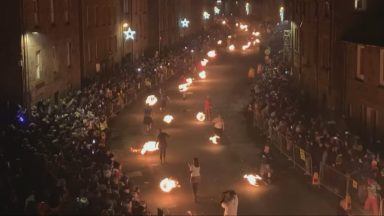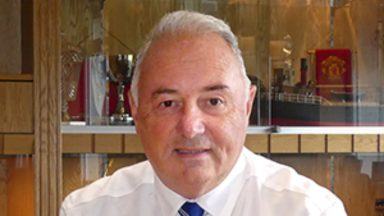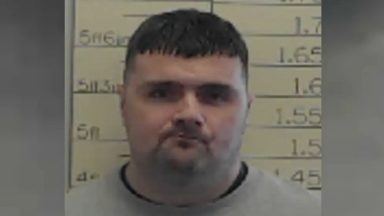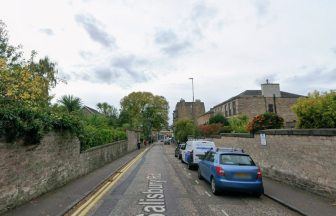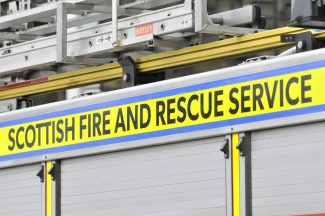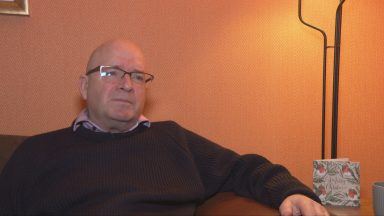A man who murdered an army veteran for “financial gain” and then left his body to decompose for 12 months in a disused industrial unit has been jailed.
David Barnes, 33, killed Ean Coutts, 60 on September 3 2019 at either his victim’s house in Kinglassie, Fife, or elsewhere in Scotland by “means unknown” to investigators.
The High Court in Edinburgh heard how Barnes tried to avoid detection for the crime by hatching an “elaborate scheme” which saw him removing Mr Coutts from his home in a wheelie bin.
He then drove Mr Coutts’s body to a disused industrial unit in Glenrothes, Fife, where he abandoned it in a cupboard.
He then attempted to set fire to the remains in a bid to conceal Mr Coutts’s identity from investigators before leaving the scene. He carried out these actions to avoid detection for murdering Mr Coutts.
The court heard how Barnes then assumed Mr Coutts’s identity and helped himself to more than £5,000 of his victim’s money which he used to buy “goods and services”.
Mr Coutts’s skeletal remains were then discovered by an urban explorer in September 2020 causing police to launch an investigation.
Officers managed to gather enough evidence to bring Barnes, of Cardenden, Fife to justice.
On Wednesday, jurors returned guilty verdicts to charges of murder and attempting to defeat the ends of justice.
Lord Mulholland remanded Barnes in custody ahead of sentencing next month. He called for a report to learn more about Barnes’s character.
He made reference to how Barnes told lies to neighbours about how Mr Coutts had gone on holiday and had moved to England in the time after he disappeared.
He said: “You murdered a man who was going about his daily business and you murdered this man for financial gain.
“Having murdered him you embarked upon an elaborate scheme to hide this murder.
“Your pack of lies unravelled. What you did was despicable.”
Lord Mulholland then told court room security guards: “Take him down.”
The verdicts came on the fourth day of proceedings against Mr Barnes who denied murdering Mr Coutts, of Kinglassie, Fife.
He also denied attempting to defeat the ends of justice in a bid to “avoid detection, arrest and prosecution” for allegedly murdering Mr Coutts.
Mr Barnes, of Fife, was standing trial on a total of 36 charges which included allegations of theft and fraud.
One of the charges told of how he used bank cards in Mr Coutts’s name to make several transactions between August 31 2019 and January 23 2020, obtaining more than £5,000 of goods.
It was also claimed that Barnes stole a Nationwide bank card in Mr Coutts’s name days before the alleged killing.
He was accused of using the card at a number of places including at a McDonalds in Glenrothes on September 6, 2019, for £15.50 and is said to have withdrawn a total of £5,610 in cash.
He was also alleged to have committed fraud by buying tickets for an “entertainment show” at Rothes Hall in Glenrothes on December 9 2019.
Barnes also allegedly applied for a credit card in Mr Coutts’s name on November 29 2019, stating that he was a self-employed forklift driver who earned £56,000 a year.
The final charge claimed Barnes contacted the Department of Work and Pensions on February 10, 2020 claiming to be Mr Coutts.
He is said is to have stated that he was now living in a caravan in England, had no access to the internet and no longer needed benefits.
Prosecutors claim this was to convince the DWP that Mr Coutts was still alive.
However, prosecutors withdrew the fraud and theft charges at the end of the Crown case leaving Mr Barnes to just stand trial on charges of murder and attempting to defeat the ends of justice. Crown lawyers led evidence about the theft and fraud charges to build a circumstantial case against Barnes.
The court has earlier heard how Mr Coutts served with the army. Jurors also heard from a statement of agreed facts which stated that Mr Coutts’s birth name was Ean Coutts. However, he was known to people as Ian Coutts from the mid 1970s.
On the first day of proceedings, James Fenton, 37 said he was looking around a unit at the Whitehill industrial estate in Glenrothes, Fife, when he saw what he thought were animal bones or a prop.
He said he called the police when he saw a skull among the debris.
Mr Fenton also told the court that he, his partner and others would look around old buildings and take photos.
Describing what he saw, he said: “At first I thought it was just like animal bones.”
He said when he moved a black tray, he saw a foot and the back of a skull.
Mr Fenton said: “I still wasn’t convinced it was a body. I thought it was a prop.”
Police then launched an investigation. They discovered from neighbours that Barnes had been working at Mr Coutts’s home carrying out renovations there.
Kevin O’Donoghue, 48, said he lived next door to Mr Coutts in Main Street, Kinglassie, Fife.
He told the court that one day he noticed the workman had put his grey coloured wheelie bin into a silver Volkswagen Golf motor car before driving away.
He told the court that he texted Mr Coutts the following day to ask him why the workman had taken his bin which he thought had been filled with “rubble” and “bricks”.
Mr O’Donoghue told that the workman later told him that his neighbour had moved away from Fife as he owed “a lot of money”.
The witness also told the court that he later spoke to the police investigating the circumstances surrounding Mr Coutts’s death.
He told officers about the time he saw the workman take the wheelie bin and he said he had made a joke to his wife about what was in it.
On Thursday, jurors heard a passage from the statement which Mr O’Donoghue gave to the police. Mr O’Donoghue said in the statement that he had been telling his wife Ramone that the workman had taken their bin away.
Mr O’Donoghue added: “I joked that I hoped it wasn’t Ian in the bin as he was struggling to move it but that was a joke.”
Prosecutor Alex Prentice KC then showed the witness a text message that he sent to Mr Coutts on September 4 2019. It read: “Why did the guy take my grey bin yesterday?”
Mr O’Donoghue said he never received a reply to the text message. He told the court that the workman later told him that Ian had gone away on a break and then said he had moved to England to live with his sister.
The court heard that during the investigation into Mr Coutts’s death, police recovered a letter belonging to Mr O’Donoghue close to where detectives had recovered the dead man’s remains.
In his closing speech, Mr Prentice said that theft and fraud charges which had been withdrawn from the indictment were originally there so that evidence could be led of transactions and the assumption by Mr Barnes’s identity.
He said: “There is no direct evidence in this case as to what happened to Ian Coutts and what led to his death.
“This is a classic case of indirect evidence, more commonly referred to as circumstantial evidence.”
“It is the experience of the courts that circumstantial evidence can be stronger and more compelling than direct evidence.”
The prosecutor said that the cause of death of Mr Coutts was unascertainable because of the condition of the body when it was discovered, although there was evidence of charring to bones.
Mr Prentice said: “There is no evidence to suggest that Ian Coutts voluntarily went to the unit and died on his own.
“The most obvious conclusion is that his body was put there and remained there for quite a considerable period of time.”
Mr Prentice urged jurors to convict Barnes of murder.
He added: “David Barnes assumed the identity of Ian Coutts and proceeded to help himself to his money and pretended to be him to acquire goods and services.
“How would he be able to do that unless he knew Ian Coutts was dead.
“I suggest there was a motive here and that was financial gain.
“He assumed the identity of Ian Coutts and benefited significantly from doing that.”
Jurors agreed and convicted him of murder and attempting to defeat the ends of justice.
Barnes will be sentenced at the High Court in Glasgow on December 13 2023..
Follow STV News on WhatsApp
Scan the QR code on your mobile device for all the latest news from around the country


 Police Scotland
Police Scotland




